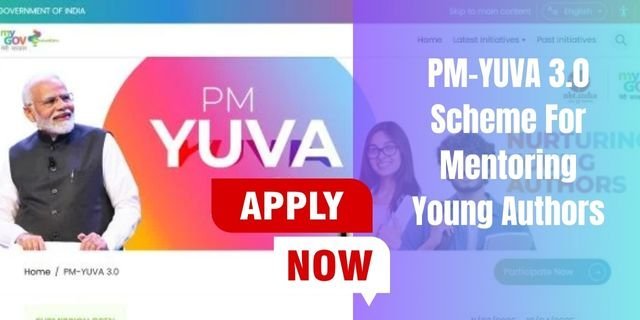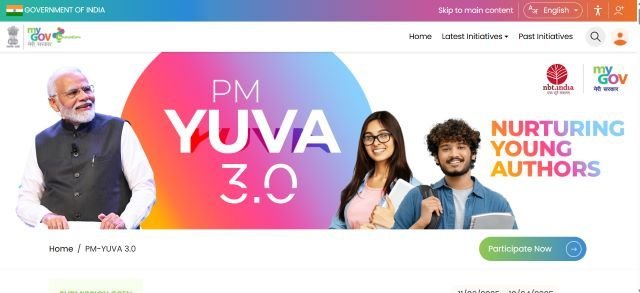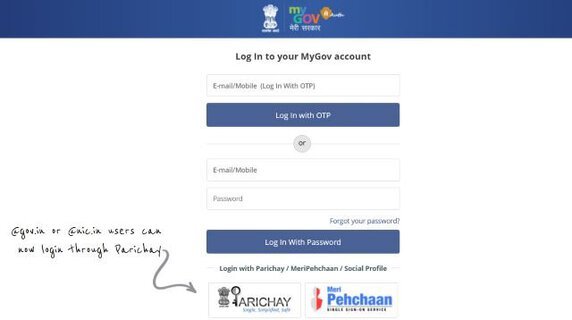PM-YUVA 3.0 is being started on 11 March 2025 because the first two editions were a big success, where many young writers took part and wrote books in 22 Indian languages and English. This scheme is made to help new authors so their skills will be improved and good books will be created. Young minds will get a chance to learn and grow, and India’s many stories will be told. Through this scheme, a better future of writing will be made.

About PM Scheme For Mentoring Young Authors
The PM Scheme for Mentoring Young Authors was started to help young minds grow and prepare them for leadership roles in the future. The National Education Policy 2020 has focused on their empowerment by creating a learning system where young readers can become future leaders. India is called a ‘young country’ because 66% of its people are young, and they can be used for nation-building. To mentor young authors, this scheme was started, and it has become an important step in shaping future creative leaders.
The first mentorship scheme was launched on 31st May 2021, with the theme “National Movement of India” as part of Azadi ka Amrit Mahotsav. It focused on Unsung Heroes, unknown facts about the Freedom Struggle, and various perspectives on the National Movement. India is ranked third in book publishing, and its rich literature must be presented to the world. Through this scheme, young authors will get a big opportunity to showcase their talent.
Objective of PM-YUVA 3.0
The objective of the PM-YUVA 3.0 is:
- To mentor young writers and improve their creative skills.
- To promote Indian literature and culture through books.
- To create a new generation of authors for the future.
- To encourage writing in different Indian languages.
Key Highlights of PM-YUVA 3.0
| Name of the Scheme | PM-YUVA 3.0 Scheme |
| Launched by | Govt. of India |
| Objective | Train young writers |
| Age Limit | Up to 30 years old |
| Total Authors | 50 will be selected |
| Themes Covered | 3 themes are there |
| Application Mode | Online only |
| Selection | Done by a special team |
| Benefits | Get mentorship and training |
| Participation Mode | Online |
| Official Website | https://innovateindia.mygov.in/ |
Eligibility Criteria
The eligibility criteria to join PM-YUVA 3.0 Scheme are as follows:
- Those who joined PM-YUVA 1.0 and 2.0 cannot apply.
- No work or studies should disturb the mentorship time.
- Age should be 30 years or less on 11 March 2025.
- Manuscripts must be sent on MyGov before 10 April 2025, 11:59 PM.
- Only Non-Fiction books are allowed in this scheme.
- After submitting, topics cannot be changed.
- Only one entry can be sent by each person.
Financial Benefits
- Rs. 50,000 will be given every month for six months.
- A 10% royalty will be earned after book publication.
- Books may be translated into many Indian languages.
- A platform will be given to share books and ideas.
Timeline
- Contest Duration: 11 March – 10 April 2025
- Proposals Evaluation: 12 April – 12 May 2025
- National Jury Meeting: 20 May 2025
- Result Announcement: 31 May 2025
- Mentorship Period: 1 June – 1 November 2025
- National Camp: 10 – 18 January 2026 (New Delhi World Book Fair)
- Book Publication: By 31 March 2026
PM-YUVA 3.0 Themes
The PM-YUVA 3.0 scheme encourages young writers to articulate their ideas and present a comprehensive outlook on India’s contributions across different fields. The themes include:
- Contribution of Indian Diaspora in Nation Building
- Indian Knowledge System (IKS)
- Makers of Modern India (1950-2025)
Theme 1: Contribution of Indian Diaspora in Nation Building
The Indian diaspora is one of the largest in the world, with over 35 million people living in around 200 countries. They include both NRIs and PIOs. Indian migration started long ago, even during Kanishka’s reign. Some early migrants, called gypsies, settled in Europe. During Ashoka and Samudragupta’s time, Indians moved to Southeast Asia. In the 16th century, many went to Central Asia and Arabic nations For trade. Later, colonial rulers sent indentured laborers To Fiji, Guyana, and Mauritius. After World War II, skilled workers moved to developed countries. Today, Indians succeed everywhere, keeping their culture alive and helping in politics, economy, and society.
Suggested Sub-themes:
- Indian Diaspora in Africa, Europe, Asia, Latin America, North America, and Australia
- Contribution to India’s Independence Movement
- Role in international relations
- Literature and writings by the Indian Diaspora
- Indian Diaspora in contemporary times
Theme 2: Indian Knowledge System (IKS)
India has always had great knowledge. It grew over thousands of years. People learned from experience, experiments, and deep thinking. This knowledge was passed through stories, books, and art. The Indian Knowledge System includes science, math, medicine, and more. India gave the world zero, the decimal system, and zinc smelting. Ayurveda and plastic surgery started long Ago. Yoga and Vedas teach deep wisdom. Old ideas still help today. They can bring new chances for growth. IKS keeps India’s culture alive. It helps people understand the value of old knowledge. Learning from the past can help build a better future.
Suggested Sub-themes:
- Vedas, Upanishads, and ancient texts
- Yoga, meditation, and Ayurveda
- Indian music, dance, and performing arts
- Traditional architecture and town planning
- Astronomy, mathematics, and scientific contributions
- Vedanta, Tantra, and Indian philosophy
- Cultural heritage and social traditions
- Ethics and management principles in ancient texts
- Yoga and Ayurveda’s role in holistic well-being
- Mindfulness and stress management through Indian practices
- Importance of IKS in present times
Theme 3: Makers of Modern India (1950-2025)
India became independent in 1947. But many problems were there. Poverty, hunger, and lack of schools were common. Leaders worked hard. A strong Constitution was written. Rights were givento all. Big institutes like IITs and IIMs were built. Scientists made progress in space and nuclear energy. Farms grew more food. Big dams and factories were set up. Art and culture were kept alive. Social leaders fought for justice. Women and poor people were given more rights. Education and jobs were made easier for them. Today, India is moving fast. Digital technology, space research, and new businesses are growing. Cities and villages are changing. Old traditions and new ideas are mixing. India moves forward with pride and strength.
Suggested Sub-themes:
- Visionary leaders and political architects
- Educational pioneers and knowledge builders
- Scientific innovators and tech revolutionaries
- Economic architects and industrial pioneers
- Infrastructure builders and urban planners
- Cultural icons and artistic luminaries
- Social reformers and champions of equality
- Global diplomats and advocates of international leadership
Note: The suggested sub-themes serve as guidelines, but participants are free to explore other relevant topics within the framework.
Proposal
Applicant should submit a book proposal of 10,000-word as below:
| Section | Required |
| Synopsis | 2,000-3,000 words |
| Chapter Plan | Yes |
| Sample Chapters | 7,000-8,000 words |
| Bibliography | Yes |
Selection Process
- A total of 50 authors will be picked.
- 10 authors will write on Indian Diaspora in Nation Building.
- 20 authors will write on Indian Knowledge System.
- 20 authors will write on Makers of Modern India (1950-2025).
- A committee will select them. It will be made by NBT.
Participate PM-YUVA 3.0
To Participate under PM-YUVA 3.0, follow these steps:
Step 1: Visit the official PM Yuva website.

Step 2: Scroll down the homepage and click on “Participate” button under “PM-YUVA 3.0” section.

Step 3: Details of the Scheme will appear on your screen.
Step 4: Now at the bottom of the page, click on “Participate Now” button.
Step 5: If you are a new user, register yourself by click on “Register Now” button.
Step 6: Then login using your credentials and the application form will appear on your screen.
Step 7: Fill out the application form and attach all the documents as asked in the form.
Step 8: Click on the “Submit” button to complete the process.
Helpline Number
- Office Address/Postal Address
Office of CEO, MyGov 3rd Floor, Room no-3015
Ministry of Electronics and Information Technology (Government of India)
Electronics Niketan, 6, CGO Complex, Lodhi Road, New Delhi – 110003 India
- Phone:
011-24301812
- Email ID:
connect[at]mygov[dot]nic[dot]in
FAQs
Who can apply for PM-YUVA 3.0?
Anyone up to 30 years old can apply.
How to apply?
Apply online through the official website.
How many authors will be selected?
A total of 50 authors will be chosen.
Is there any fee for applying?
No, applying is completely free.
What is the main goal of PM-YUVA 3.0?
It helps young writers improve skills.